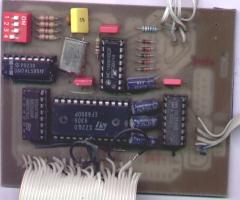Difference between revisions of "CPCI RS232 Interface"
From CPCWiki - THE Amstrad CPC encyclopedia!
m (1992 it was published in the CPCAI again (don't have the issue here)) |
m (Some additional info) |
||
| Line 1: | Line 1: | ||
| + | [[Image:CPCAI-RS232interface.jpg|thumb|[[Octoate|Octoate's]] selfbuild version of the CPCI RS232 interface]] | ||
| + | |||
This [[RS232]] interface was published as a DIY project in a special edition of the the German | This [[RS232]] interface was published as a DIY project in a special edition of the the German | ||
magazine: [[CPC Schneider International]] (Sonderheft, #3-1986) and also in a later issue. | magazine: [[CPC Schneider International]] (Sonderheft, #3-1986) and also in a later issue. | ||
| − | As the standard CPC series does not include a [[RS232]], this interface was very handy in order to communicate with other computers(eg. IBM PCs) | + | A terminal program, written by [[The Cranium]], for this serial interface was published in the last issue of the [[CPC Schneider International]] (12/1 1992/1993). |
| + | |||
| + | As the standard CPC series does not include a [[RS232]], this interface was very handy in order to communicate with other computers(eg. IBM PCs). A major drawback was the missing interrupt line which means that your programs have to poll the interface. | ||
== Technical specs == | == Technical specs == | ||
Revision as of 08:15, 4 September 2006

Octoate's selfbuild version of the CPCI RS232 interface
This RS232 interface was published as a DIY project in a special edition of the the German magazine: CPC Schneider International (Sonderheft, #3-1986) and also in a later issue.
A terminal program, written by The Cranium, for this serial interface was published in the last issue of the CPC Schneider International (12/1 1992/1993).
As the standard CPC series does not include a RS232, this interface was very handy in order to communicate with other computers(eg. IBM PCs). A major drawback was the missing interrupt line which means that your programs have to poll the interface.
Technical specs
Based around: MC6850, and MAX232 Ports used: F8DC - Control register, F8DD - Data register.
How to build a RS232 interface (German)
- RS232



